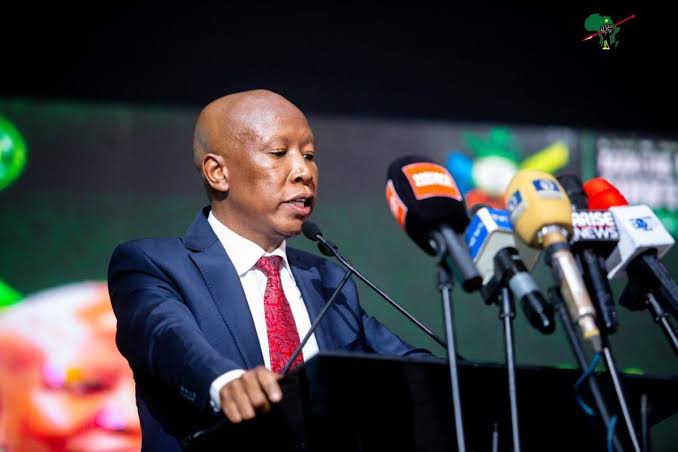News Investigators/ South African opposition leader, Julius Malema, has extolled Nigeria’s contributions towards ensuring South Africa’s freedom from apartheid.
Mr Malema, the founder and leader of the Economic Freedom Fighters (EFF), also condemned xenophobia in South Africa, calling it “a betrayal of African unity”.
Mr Malema spoke at the opening of the 2025 Annual General Conference of the Nigerian Bar Association (NBA) held at International Conference Centre, Enugu on Sunday evening.
He said Nigeria was one of the countries that stood firmly by South Africa, during that country’s darkest hour.
Malema said: “I must reiterate once again that it is a deep honour to stand before you today in Enugu State in Nigeria, a country that holds a special place in the hearts of all South Africans.
“We understand history, feel solidarity
and appreciate the sacrifice made by others in the course of our history.
Nigeria is not just another African country to us”.
He recalled that when South Africa was shackled by apartheid and their people were murdered, imprisoned, and denied basic humanity, Nigeria rose as a giant for justice, placing his country squarely at the centre of its corridors.
According to him, Nigeria set up the Southern African Relief Fund and
mobilised its citizens to contribute to the liberation struggle.
“Even as it faced its own challenges at home, these initiatives raised millions of dollars to support the liberation of South Africa as people paid directly from their salaries to contribute to the liberation struggle.
“Nigerian students sacrificed a portion of their income, through the Mandela Tax,
which supported an educational training programme for Black South Africans.
“A successive Nigerian government never stopped in their material and moral support for South Africa’s liberation.
“In fact, Nigerian government boycotted the 1976 Olympic Games and the 1979 Convention of the Multiculturalists,” Malema said.
He added that Nigerian students did not only contribute through Mandela Tax, but also, through protests in opposition to apartheid.
“We can neither forget all those who stood by us during difficult times, nor can we forget that when Nelson Mandela was released from prison in 1990, one of his earliest international visits was Lagos and Abuja to personally thank the Nigerian people.
“These gestures are the foundation of a bond sealed in blood and sacrifice. However, this history must not remain in the past.
“This bond between South Africa and Nigeria must be carried forward into the present, not just in political sentiment but in concrete economic collaboration as both our nations stand as giants of the continent,” he stressed.
Malema urged collaboration between both countries, to tap in areas where one has advantage over the other.
He identified, mining, advanced infrastructure, financial system, entrepreneurial spirit, oil and gas resources and cultural dynamics, as areas that both countries could work together.
“Together, we hold the keys to Africa’s industrialisation and economic independence when we consider what lies beneath our soils.
“Nigeria is blessed with abundant oil, natural gas, and growing agricultural sector.
“South Africa holds some of the richest deposits of platinum, gold, manganese, and coal in the world.
“Combined, we possess the minerals that power modern technology, the energy resources that fuel global industry and the human capital to build a self-sufficient continent,” he said.
Malema, however, expressed the regret, that with all the potentials, abundance natural resources, yet, both nations “remain strapped in neo-colonial arrangements where our raw materials are extracted cheaply
“These raw materials are exported to Europe, America, and Asia only to be sold back to us at crazy prices as finished goods,” he decried.
According to him, both countries can build factories and process their resources on African soil.
“Imagine a joint programme where South African mining expertise is combined
with Nigerian oil wealth, to create African-owned energy and resources.
“Imagine agricultural cooperation where
Nigerian fertile lands provide food security for the continent, supported by
South African machinery, logistics, and technology.
“Imagine a collaborative investment in renewable energy, where South African
solar potential and Nigeria gas reserves are harnessed to build an integrated African power grid,” he said.
Malema noted that South African companies such as MTN, SPAR, Multi choice and others had made significant progress in Nigeria through
creation of jobs and services.
He also said that the Nigerian businesses and investors, and cultural industries had equally expanded
to South Africa.
Specifically, he said the Nigerian music, films and writings influence South African culture.
Malema, however, decried that the cooperation has been uneven and, at times, marked by suspicion and the painful experience of xenophobia.
He, specifically denounced South Africa’s hostility and discrimination against Nigerians and citizens of other African countries, manifesting in violence, killings, looting, and attacks on their businesses.
According to him, xenophobia is a betrayal of African unity and a sickness born of poverty.
NAN
